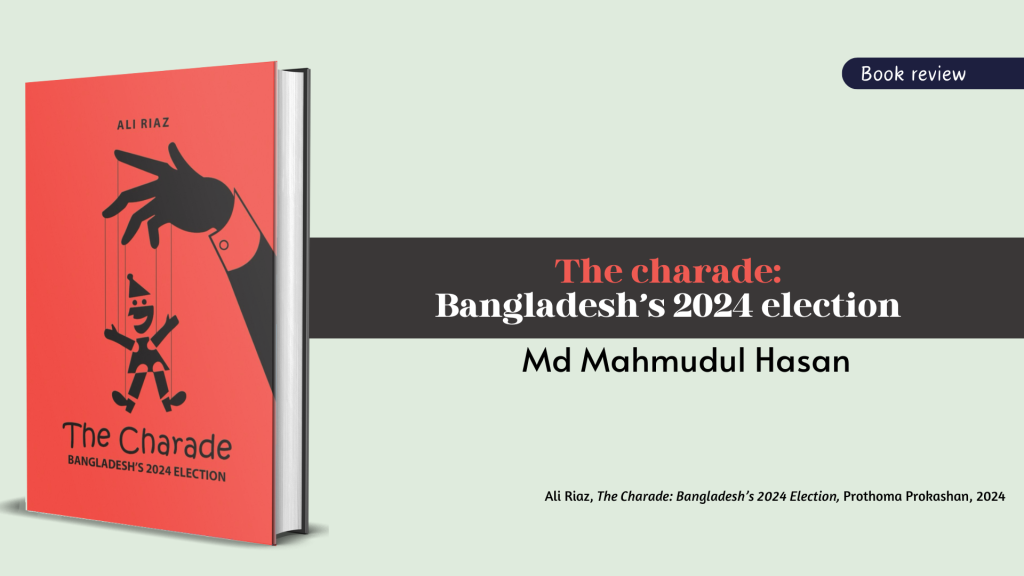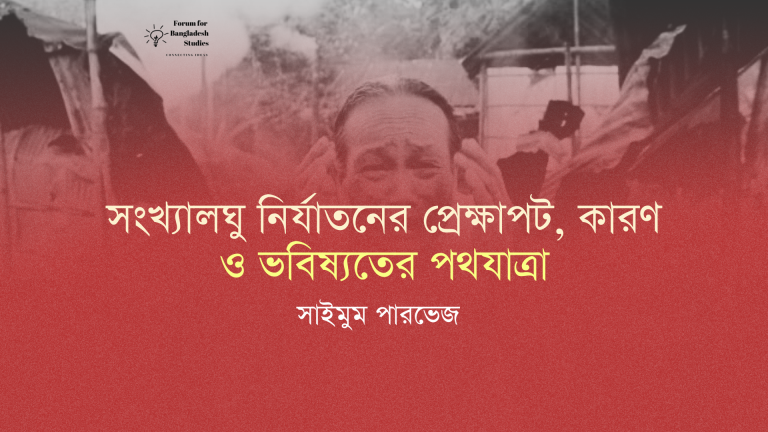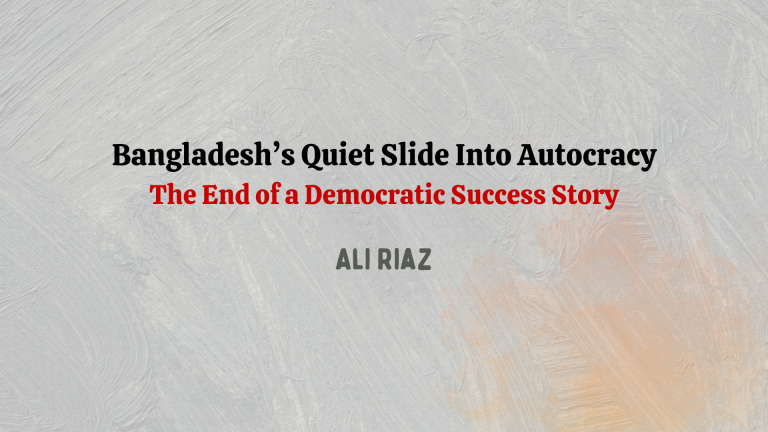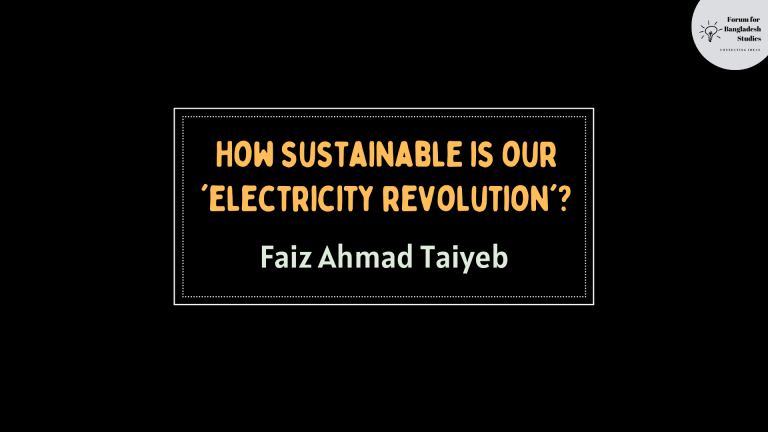AS A Bangladeshi, I would have been the happiest person if Bangladesh’s political quandary that Ali Riaz portrays in The Charade: Bangladesh’s 2024 Election (2024) were untrue. Unfortunately, the torrent of words that flowed from his pen and contained in the book express an existential crisis generated by a poisonous political climate that has swept Bangladesh for over a decade. All these have caused Bangladeshis to lose their democratic rights as well as their faith in the prevailing political system.
The various chapters that comprise the main part of The Charade appeared in outlets inside and outside Bangladesh from May 25, 2023 to January 18, 2024. Riaz added an introduction and a conclusion to weave a thread through the book and string its discussions together. Marked by premonition and admonition, his commentaries point to a lineage of events — landmarked by the scrapping of the nonpartisan caretaker system in 2011 — that have led to a mounting crisis of legitimacy of the regime in Dhaka.
Riaz’s book surveys pre- and post-January 7 election events and all the tamasha (hoax) that took place in the name of election. It was an election where the ruling party (or its chief) decided who would be the winners and losers. As the previous two elections in 2014 and 2018 were tainted by nonparticipation of the opposition and nocturnal ballot stuffing respectively, this time the incumbent pursued a novel strategy: fielding ‘dummy candidates.’ That is to say, in order to give the election a veneer of multiparty participation, candidates from within the ruling party base were propped up to compete with its official candidates and many of those dummies were ‘allowed’ to win. As a result, as Riaz reveals, the roots of almost all winners — 295 out of 298 — in Bangladesh’s 2024 election were found within the broad Awami League family (p. 105).
The Charade provides an account of how the absence of people’s right to choose their government has contributed to the steady deterioration in human rights, civil liberties and democratic values in Bangladesh. In a nutshell, over a period of one and half decades, Bangladesh’s political culture has transitioned from the incumbent’s partisan behaviour to personalistic autocracy.
As Riaz shows, the absence of democratic norms and institutions in Bangladesh translates into ‘[d]windling foreign reserves, a liquidity crisis in banks, a growing trade imbalance, severe depreciation of local currencies, and the rising cost of fuels and daily necessities’ (p. 4). By painting such a bleak picture of Bangladesh’s economy, Riaz debunks the myth of ‘development’ under the current regime. He lays bare the abyss of financial ruin and people’s economic pangs, as the country has sunk into a cycle of political oppression and a culture of corruption. The situations are exacerbated by ‘unsustainable infrastructure spending, loan defaults and banking malpractice, corruption in the energy sector and capital flight[,] … [u]nabashed cronyism, continued borrowing from external and domestic sources, and printing money to fill the deficit’ (p. 4). Thus, The Charade acts as a counter to the deluge of propaganda that the state and its machineries have poured into the domestic and international media to create a narrative that Bangladesh under Sheikh Hasina is experiencing spectacular development.
Partly because of hope-instilling statements prior to the election from some western governments about the need for free and fair elections in Bangladesh, its people anticipated that the 2024 election would marshal a democratic soft landing and bring about democratic consolidation in the country. Unfortunately, we have not seen such a turn around. As Ali Riaz explicates in The Charade, what we have witnessed is the unfolding of a democratic backsliding and a steady rise of (personalistic) authoritarianism. Understanding this is not a hard nut to crack for dominant western governments, but whether they would really follow up their words has remained a big question for ordinary Bangladeshis.
India’s role in influencing Bangladesh’s elections is not swept under the carpet any more. Its favouritism for an acquiescent political force in Bangladesh that servilely looks after its interests as opposed to those of Bangladesh has now become evident. It is obvious that India is capable of helping secure the political incumbency of the ruling Awami League and this is reciprocated by an avalanche of gratitude from the Sheikh Hasina government to the neighbouring country. Perhaps, no one needs any convincing that the incumbent Awami League government is keener on pleasing India than on looking after the interests of the people of Bangladesh. These lead some politicians and commentators to use the term ‘the golden era’ (p. 12) to describe the relationship between the two neighbouring countries. But is such a characterisation plausible if we look at the dynamics of Bangladesh-India relations through the prism of the interests of Bangladesh? The answer that is inferred from the pages of Riaz’s book is in the negative.
The Charade makes it abundantly clear that, in order to cling to power, the Awami League government depends more on India’s backing than on the mandate of the people of Bangladesh. Since it came to power in early 2009, the regime has provided ample reasons for India to throw its weight around to ensure the perpetuation of Awami rule in Bangladesh. This seemed to have removed any election anxiety from the mind of the Awami League secretary general who is quoted by Riaz as saying prior to the 2024 election: ‘As Delhi is there, so are we. There is nothing to worry about’ (p. 44).
On August 18, 2022 during Hindu Janmashtami (the birthday of Krishna) celebration in Chattogram, Awami League’s former foreign minister AK Abdul Momen made it clear that he had urged the Indian government to do everything in its wherewithal to ensure the continuance of Sheikh Hasina’s rule in Bangladesh. He said, ‘I went to India and said that Sheikh Hasina has to be kept in power’ (Prothom Alo, August 19, 2022). Later in a June 2023 article titled ‘India’s Stake in Awami League’s Victory,’ the octogenarian Indian journalist Hiranmay Karlekar echoed and reciprocated Momen’s wish, stating: ‘India must do everything possible … to help Sheikh Hasina-led Bangladesh Awami League win the parliamentary elections scheduled in that country in January 2024.’
As opposed to India’s blanket protection of the Awami League government against charges of election malpractices, in May 2023, the US Department of State announced a new visa policy to help ensure Bangladeshis’ right to vote and choose their own government. It makes provision for the US government to restrict the issuance of visas for any Bangladeshi individual ‘believed to be responsible for, or complicit in, undermining the democratic election process in Bangladesh.’ The fact that a foreign country felt the need to consider such a deterrent strategy to help prevent election fraud and restore the integrity of our electoral process is an embarrassment for our country.
Ali Riaz interprets the new US visa policy involving Bangladesh’s election as ‘a reflection of the growing exasperation in Washington about governance in Bangladesh’ (p. 6). His book provides evidence to show that the behaviour of Bangladesh’s election commission and of the government in the runup to the election day clearly pointed to deliberate attempts to stifle the election process. However, although the incumbent Awami League snatched a questionable victory, the US has not implemented the stated visa policy to date.
By the way, though it is not adequately acknowledged, the people of Bangladesh owe the US government a debt of gratitude for helping mitigate extrajudicial killings. If we look at the statistics of unlawful killings and enforced disappearances involving the elite Rapid Action Battalion, it is undeniable that the US action — targeted sanctions against RAB officials — helped shift the curve of human rights violations in Bangladesh down. That success arguably lifted the hope of tens of millions of people in Bangladesh that the visa policy would help restore their electoral rights and thus set an example of the US’s democracy promotion assistance internationally.
Although Bangladesh does not have much influence on the global stage, it is the 8th most populous country in the world. The absence of democratic values and the lack of accountability of its government to the electorate affect its huge population. Ali Riaz talks about the shortage of ‘values-based diplomacy’ and ‘values-based foreign policy’ and consequent dangers and cracks in the international order and how they affect the people of Bangladesh (p. 129). The question now is: Will the US use the Bangladesh case to set an example of values-driven foreign policy by following ‘through [on] its promise to defend Bangladesh’s democracy’ (p. 18)?
Originally Published: New Age, 03 April 2024




